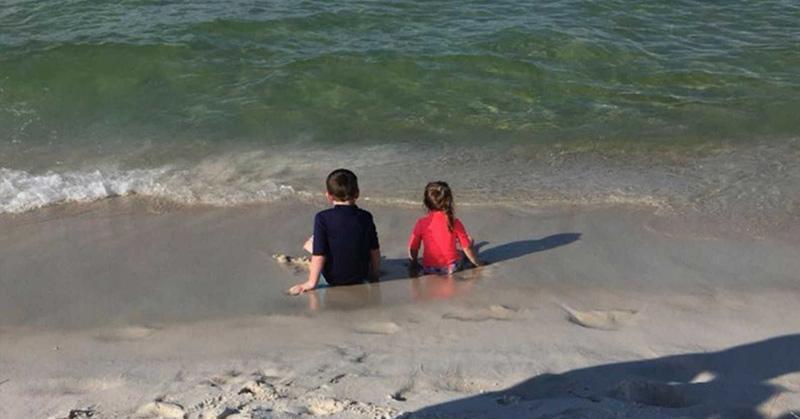Vickie Tate and her husband were at a funeral visitation when their grieving friend left them with these words:
“No matter what, when it’s all said and done, you need memories because sometimes that’s all you have left. You need to take those trips with your kids. Every single one you talk about.”
Ever since that moment, the Tates have lived by those words. Even if they have to put the trip on a credit card (within a reasonable amount) and pay it off later, they do it. Even if they can only manage to get away for a few days, they do it. They’ve stopped worrying so much about kids’ behavior, finances, and missed workdays, and instead, they just take the trip.
Vickie cannot emphasize it enough: “Time is precious and we’re not promised tomorrow,” she says. “Trust me. Take. The. Trip” [1].
Read: Science confirms that travelling makes us happier than material wealth ever will
Travelling Benefits Your Kids
Many people think that traveling with young kids is not worth it, since they may not remember most of the experience, but taking a trip with your children is profoundly beneficial no matter what their age.
It gives you the gift of time. When you’re no longer focused on work or daily routines, you are able to give your kids more attention. Having time to actually interact and play with your children is not only fun, but it’s an opportunity to engage in “attachment play”. Attachment play provides children with an early foundation for what to expect in a relationship and facilitates the development of emotional regulation, social skills, and empathy [2,3].
The importance of this type of interaction cannot be stressed enough, especially since most families do not engage in it regularly. 65 percent of parents say they only play occasionally with their children, and 25 percent of children say they only talk to their parents about something that matters once per week [2].
It helps their brains develop. While on vacation, your child has ample opportunity to exercise what Jaak Panksepp, who was a researcher of Integrative Physiology and Neuroscience at Washington State University, calls the “play” system and the “seeking” system of the brain.
Not surprisingly, the play system is stimulated every time you play with your child. This elevates feelings of social joy in your child’s brain, which has been proven to effectively reduce and prevent depression. The seeking system is activated when you get out and explore with your kids. This system is demonstrated as joy in your brain and counteracts feelings of anxiety. When you stimulate the play and seeking systems in the brain, it activates chemicals that counteract psychological pain, which are often referred to as “brain opioids” [4].
Regular stimulation of these areas of the brain helps the frontal lobes of your child’s brain to develop, which are the areas of the brain involved in cognitive functioning, social intelligence and well-focused, goal-directed behaviors [2,5].
It could increase their IQ. “Enriched environments” and new experiences provide your child with social, physical, cognitive and sensory interactions, and are also associated with a higher IQ in children [2,6].
Travelling Benefits Your Whole Family
All of these benefits- attachment play, activating the “seeking” and “play” systems in the brain- don’t just benefit the kids, they benefit you, too. Social interaction and play are just as important for adults in combating depression and promoting feelings of well-being.
As Panskepp says “Human relationships are the best antidepressants” [4].
The Importance of Making Memories
Creating memories with your friends and family is profoundly important. But what makes these memories so beneficial to us is the ability and the opportunity to look back on them. Amanda Barnier and Penny Van Bergen of Macquarie University explain that reminiscing over shared memories allows us to empathize with and understand one another better, and can ultimately strengthen the bond we have with the important people in our lives [7].
They explain that talking about the past helps to create and maintain both our identity as an individual, and the identity we have as a group.
“We know who we are – whether as individuals, groups or communities – because our memories provide a database of evidence for events we have experienced and what they mean to us.” [7]
The act of sharing memories is particularly beneficial for young children because it teaches them how to remember. The way you talk to your young child about the past is very important in the development of their memory [8].
The benefits of memory-sharing are apparent as children get older. Older kids whose families regularly engage in emotion-rich story-telling tend to have higher levels of self-esteem and show greater resilience when they are faced with adversity [9].
Memories that Last a Lifetime
As life goes on, it is inevitable that we will gradually begin to lose people who are important to us. For this reason, it is crucial that we use the time we have with them to create memories that will sustain us long after they are gone.
As Vickie Tate’s grieving friend said, “you need memories because sometimes that’s all you have left”.
Keep Reading: The Sunday Family Dinner Is Nearly Obsolete, But it’s One That’s Worth Bringing Back
- https://www.lovewhatmatters.com/for-those-of-you-thinking-of-taking-your-family-on-vacation-but-youre-not-100-sure-take-the-trip/
- https://www.telegraph.co.uk/travel/family-holidays/the-science-behind-how-holidays-make-your-child-happier-and-smarter/
- https://www.scoe.org/files/FilpHanke-Promoting-Attachment-Through-Play.pdf
- https://www.youtube.com/watch?v=65e2qScV_K8
- https://onlinelibrary.wiley.com/doi/abs/10.1046/j.1360-0443.2002.00025.x
- https://onlinelibrary.wiley.com/doi/abs/10.1111/nan.12102
- https://theconversation.com/remember-when-we-why-sharing-memories-is-soul-food-35542
- https://srcd.onlinelibrary.wiley.com/doi/abs/10.1111/j.1467-8624.2006.00960.x
- https://www.emory.edu/news/Releases/familymeals1129128206.html

